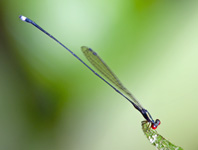Abstract
Psaironeura angeloi sp. nov. (Holotype male deposited in FSCA: ECUADOR, Esmeraldas Province, small stream 5.6 km NW of Lita, 00.893°N 78.510°W, 4.II.1997, KJT leg.) is described and illustrated based on specimens from Ecuador, Panama, Costa Rica, and Nicaragua, bringing the total number of species in the genus to five. The new species is closely related to P. remissa (Calvert), a Mexican/northern Central American species with broad, foliate male cerci, but is distinct in that the long flagella of the genital ligula lack a small sharp spine unique to P. remissa, labrum and clypeus are orange-red, and the back of the head is mostly pale in both males and females. In life, the eyes of the new species are bright red in males versus green and black in P. remissa.
References
Calvert, P.P. (1903) Odonata. In: Godman, F.D. & Salvin, O. (Eds.), Biologia Centrali-Americana: Insecta Neuroptera. R. H. Porter and Dulau Co., London, pp. 129–144.
Calvert, P.P. (1907) Odonata. In: Godman, F.D. & Salvin, O. (Eds.), Biologia Centrali-Americana: Insecta Neuroptera. R. H. Porter and Dulau Co., London, pp. 309–404.
Dijkstra, K-D.B., Kalkman, V.J., Dow, R.A., Stokvis, F.R. & van Tol, J. (2013) Redefining the damselfly families: a comprehensive molecular phylogeny of Zygoptera (Odonata). Systematic Entomology, 39 (1), 68–96.
http://dx.doi.org/10.1111/syen.12035
Esquivel, C. (1993) Psaironeura selvatica sp. nov. (Odonata: Protoneuridae), a new damselfly from Costa Rica. Revista de Biología Tropical, 41 (3), 703–707.
Förster, S. (2001) The Dragonflies of Central America Exclusive of Mexico and the West Indies. A Guide to Their Identification. Odonatological monographs 2, Gunnar Rehfeld, Wolfenbüttel, 140 pp.
Garrison, R.W. (2004) An analysis of the Psaironeura tenuissima complex, including synonymy of P. machadoi De Marmels with P. bifurcata (Sjostedt) (Zygoptera: Protoneuridae). Odonatologica, 33 (1), 83–89.
Garrison, R.W., von Ellenrieder, N. & Louton, J.A. (2010) Damselfly genera of the New World. An illustrated and annotated key to the Zygoptera. The Johns Hopkins University Press, Baltimore, xiv + 490 pp.
Kimmins, D.E. (1970) A list of the type-specimens of Odonata in the British Museum (Natural History) Part III. Bulletin of the British Museum (Natural History), 24 (6), 171–205.
Moulton, S.R., Trauth, S.E. & Harp, G.L. (1987) The mesostigmal complex of Argia using scanning electron microscopy (Zygoptera: Coenagrionidae). Odonatologica, 16 (3), 285–289.
Paulson, D.R. (2014) South American Odonata. Available from: http://www.pugetsound.edu/academics/academic-resources/slater-museum/biodiversity-resources/dragonflies/south-american-odonata/ (Accessed 12 September 2014).
Riek, E.F. & Kukalovà-Peck, J. (1984) A new interpretation of dragonfly wing venation based upon Early Upper Carboniferous fossils from Argentina (Insecta: Odonatoidea) and basic character states in pterygote wings. Canadian Journal of Zoology, 62 (6), 1150–1166.
Robertson, H.M. & Paterson, H.E.H. (1982) Mate recognition and mechanical isolation in Enallagma damselflies (Odonata: Coenagrionidae). Evolution, 36, 243–250.

